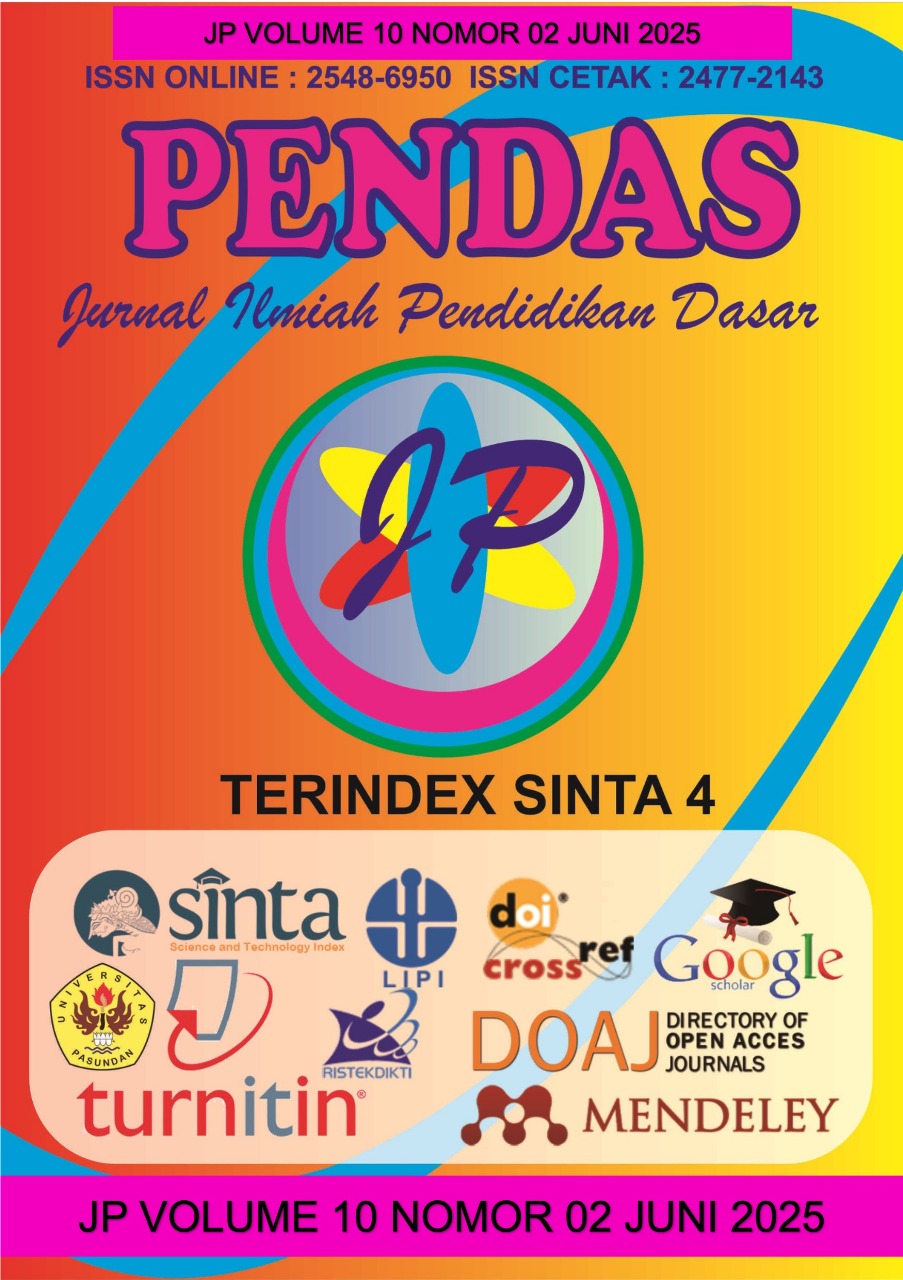PERBANDINGAN HASIL BELAJAR MATEMATIKA SISWA YANG DIAJAR DENGAN MODEL PEMBELAJARAN KOOPERATIF TIPE TGT (TEAMS GAMES TOURNAMENT) DENGAN GI (GROUP INVESTIGATION) PADA SISWA KELAS VIII SMP YP-PGRI 4 MAKASSAR
DOI:
https://doi.org/10.23969/jp.v10i2.27136Keywords:
Mathematics Learning Outcomes, TGT Type Cooperative Learning Model With GI, Algebraic Operations.Abstract
Johanis Pao Ali. 2014. Comparison of Mathematics Learning Outcomes of Students Taught with TGT (Teams Games Tournament) Type Cooperative Learning Model with GI (Group Investigation) in Grade VIII SMP YP-PGRI 4 MAKASSAR. Thesis, Department of Mathematics Education, College of Teacher Training and Education (STKIP) Ujung Pandang Education Foundation (YPUP).This research is a type of experimental research carried out at SMP YP-PGRI 4 Makassar. This study aims to find out whether the mathematics learning outcomes of students taught with the TGT (Teams Games Tournament) type cooperative learning model are higher than the GI (Group investigation) type cooperative learning model. The research sample was grade VIIIA students of SMP YP-PGRI 4 Makassar consisting of 34 students who were taught using the TGT (Teams Games Tournament) type cooperative learning model and class VIIIB students consisting of 33 students using the GI (Group investigation) cooperative learning model, 2014/2015 school year. The data collection instrument used is a learning outcome test.The results of descriptive statistical analysis concluded that the learning outcomes taught used the TGT (Teams Games Tournament) type cooperative learning model with an average learning outcome score of 72.00 with a standard deviation of 12.30 while the learning outcomes taught using the GI (Group Investigation) type cooperative learning model) with an average learning outcome score of 61.42 with a standard deviation of 11.26. Based on the results of inferential statistical analysis, it can be concluded that the learning outcomes of squares and rectangles of students who are taught using the TGT (Teams Games Tournament) type cooperative learning model are higher than those of students who are taught using the GI (Games Investigation) type cooperative learning model.
Downloads
References
Dalyono. 2010. Psikologi Pendidikan. Jakarta: PT. Rineka Cipta.
Dedi. Defenisi pembelajaran kooperatif Menurut Parah Ahli.(http://dedi.blogspot.com/2013/05 pengertian- pembelajaran kooperatif.hmtl). (Online ). (diakses tanggal 30 maret 2014).
Hamzah. 2011. Belajar Dengan Pendekatan. Jakarta: PT Pustaka Aksara.
Isjoni. 2009. Pembelajaran Kooperatif Meningkatkan Kecerdasan Komunikasi Antar Peseta Didik.Yogyakarta: Pustaka Pelajar.
Komalasari,Kokom. 2010. Pembelajaran Kontekstual Konsep dan Amplikasi. Bandung: PT Refika Aditama.
Lestari.2013.Kelebihan dan Kelemahan Pembelajaran Kooperatif Tipe TGT. http://tarynugrohotappuy. blogspot. com/2013/04/normal-0-false-false-false-in-x-none- x.html : (Online). (diakses tanggal 30 maret 2014).
Mellyirzal.2014.Hakikat pembelajaran matematika. (http://mellyirzal.blogspot.com/2008/ 12komunikasi - matematika. html. (Online). (diakses tanggal 4 maret 2014).
M-Edukasi.2014.Model pembelajaran Kooperatif tipe Gi. http: //www. m edukasi.web.id/2012/04/model- pembelajaran-group-investigation.html: (Online). (diakses tanggal 4 maret 2014).
Mirna.2014.Teori BelajarMatematika.http://himitsuqalbu.wordpress.com/2011/11/04/teori belajar-matematika-makalah/: (Online). (diakses tanggal 30 maret 2014).
Purwanto. 2013. Evaluasi Hasil Belajar, Cet. XIII, Yogyakarta: Pustaka Pelajar.
Pupuh, Fathurrohman, dan Sobry, Sutikno. 2009. Strategi Belajar Mengajar, Bandung: PT Refika Aditama.
Rusman. 2012. Model-model Pembelajaran Mengembangkan profosionalisme Guru.Jakarta: PT Raja Grafindo Persada.
Sanjaya Wina. 2012. Strategi Pembelajaran Berorientasi Standart Proses Pendidikan, Jakarta: Kencana Prenada Media Group.
Slameto. 2010.Belajar dan aktor Faktor yang Mempengaruhinya, Jakarta: Rineka Cipta.
Subana, dkk. 2000. Statistik Pendidikan. Bandung: Pustaka Setia.
Suherman, dkk. 2003. Metode Pembelajaran Matematika Kontemporer, Bandung: Jurusan Pendidikan Matematika UPI.
Sukino, Wilson. dkk. 2006. Matematika SMP KELAS VIII. Jakarta: PT. Gelora Aksara Pratama.
Supranto, J. 2008. Statistik Teori dan Aplikasi. Jakarta: Erlangga
Suprijono Agus. 2009.Cooperative Learning.Yogyakarta: Pustaka Pelajar.
Tiro, Muhamad Arif. 2008. Dasar Dasar Statistika. Makassar: AndiraPusbliser. Makassar.
Wati Erna. 2010. Pengertian Matematika Menurut Beberapa Parah Ahli. (http://www.sarjanaku.com/2010/09/hakikat-matematika.(Online). (diakses tanggal 30 maret 2014).
Wawan Lystiawan. 2012. Model pembelajaran kooperatif Group Investigation (GI) http://www.wawanlistyawan.com/2012/08/model pembelajaran-kooperatif-group.html.(Online ). (diakses pada tanggal 30 maret 2014).
Wirodikromo, Sartono. 2007. Matematika Untuk SMA Kelas XI. Jakarta: Erlangga
Downloads
Published
Issue
Section
License
Copyright (c) 2025 Pendas : Jurnal Ilmiah Pendidikan Dasar

This work is licensed under a Creative Commons Attribution 4.0 International License.














































